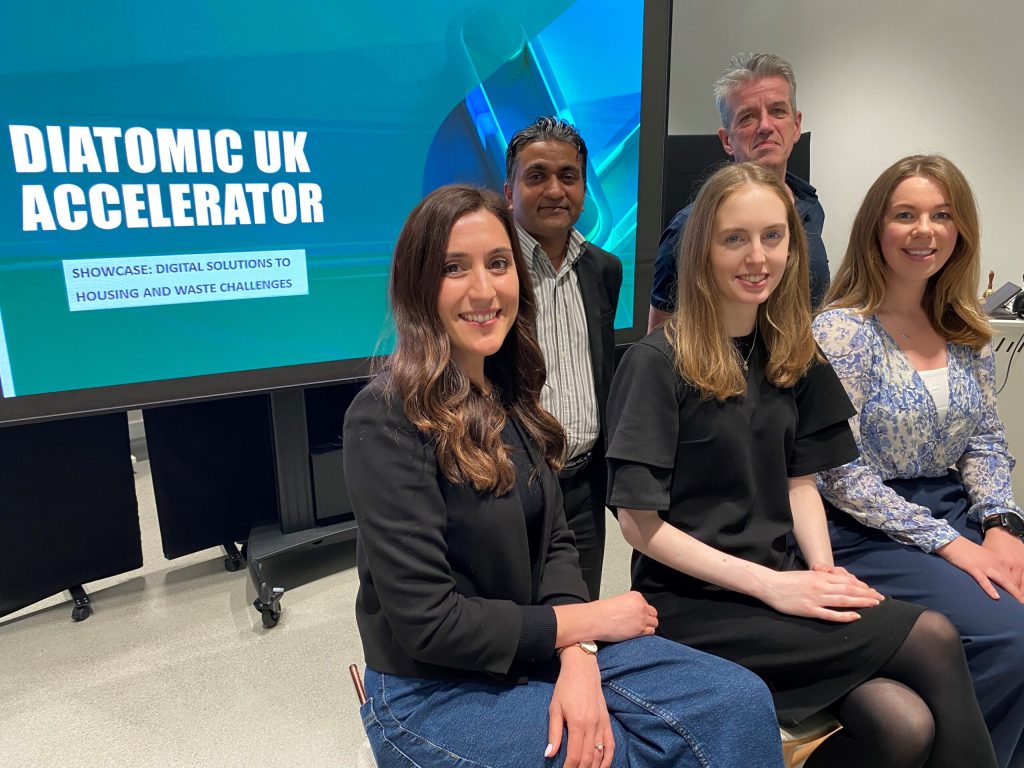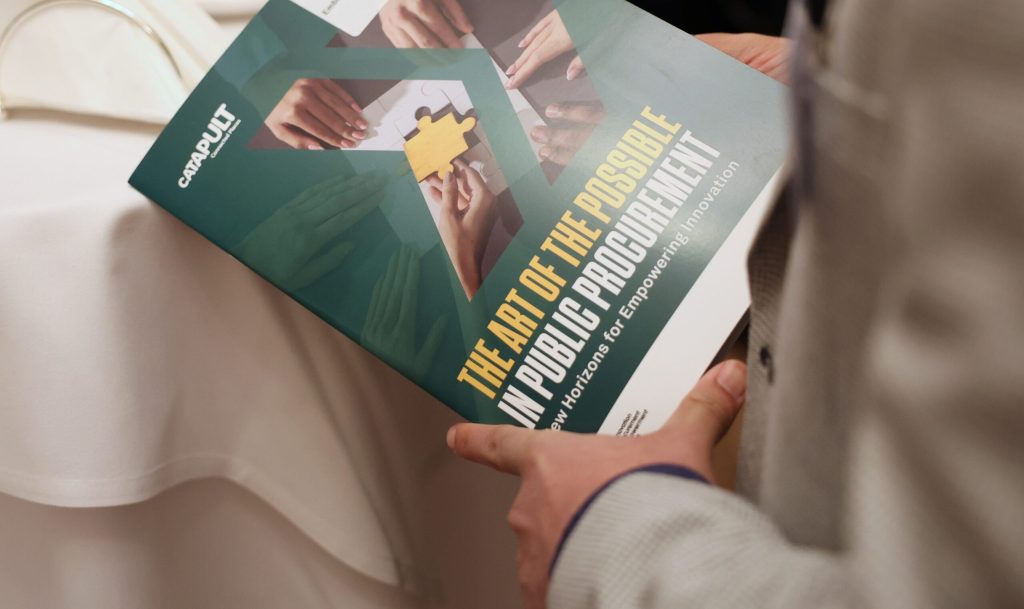CAT_2501_AW-0023-HiRes
Procurement Act Knowledge Hub

This announcement initiates a critical six-month preparation phase, urging contracting authorities and suppliers, including SMEs and VCSEs, to expedite the refinement of their operational processes and engage in requisite training to seamlessly adapt to the forthcoming changes. In support of this preparation effort, IPEC has curated a comprehensive fact sheet with key training opportunities and resources currently available.
E-learning modules
- The Cabinet Office has introduced E-learning modules designed exclusively for procurement practitioners.
- These modules comprehensively cover all aspects of the upcoming reforms, encompassing key regulatory changes, transparency enhancements, and insights into the competitive flexible procedure.
Knowledge drops series
- The Knowledge Drops series presents succinct video overviews explaining the upcoming procurement regulation changes.
- Tailored for diverse audiences, including contracting authorities, suppliers across various sectors, SMEs, and VCSEs, these resources aim to facilitate a nuanced understanding of the evolving landscape.
Art of the possible in public procurement report
- “Art of the Possible in Public Procurement” report – serves as a valuable resource, highlighting the potential of implementing the new Procurement Act, offering practical guidance and real-world case studies of successful innovation procurement.
Communities of practice
- Launching on 8 May 2024, Communities of Practice provide opportunities for procurement professionals to share knowledge, experiences, and insights via MS Teams meet-up events.
- These sessions will cover diverse topics across the procurement lifecycle, fostering confidence in navigating the Procurement Act 2023.
Guidance documents
- Comprehensive Procurement Act 2023 guidance documents, covering topics such as transitional arrangements, pre-market engagement, award rules, and more. Set to be fully released by the Cabinet Office by June 2024.
Stakeholder webinars
- Stakeholder webinars is a series of update webinars, providing a comprehensive update on the Transforming Public Procurement programme. Webinars will cover milestones, learning opportunities, digital platform progress, transition details, and preparation for upcoming changes.
- Three dates are available:
– Wednesday 15 May from 10am to 11am
– Tuesday 21 May from 11.30am to 12.30pm
– Friday 24 May from 2pm to 3pm
For assistance in selecting the most suitable learning options for your team, the Cabinet Office has prepared a Learning and Development brochure outlining all available support.
We trust this factsheet proves helpful in your preparations for the forthcoming Procurement Act changes. For any inquiries or guidance, please feel free to reach out to us at ipec@cp.catapult.org.uk
Encouraging regional leaders to take risks and reap rewards with innovative firms

Public sector leaders spend as much as £300 Billion on third party suppliers every year in the UK. But if just 5% of that money was spent on innovative products and services it could unlock £15 Billion to support some of our most creative companies.
One region exploring how procuring new solutions could unlock value for local businesses and people is the West Midlands, where Connected Places Catapult is leading the DIATOMIC Accelerator, bringing together nine innovative firms with Birmingham City Council.
At a showcase event to promote the programme at the STEAMhouse in Birmingham in April, Principal Place Development Lead, Catherine Hadfield explained: “DIATOMIC is all about digital innovation, and the programme is supporting SMEs in the region with innovative solutions to some of the region’s biggest challenges around housing and waste management.”
Catherine chaired a panel session, and asked those alongside her for their thoughts on how best to create frameworks that allow innovation to thrive.
“For me, it’s about leadership,” replied Rikesh Shah, the Head of the Innovation Procurement Empowerment Centre. “It means senior professionals saying to their teams they have permission to experiment with new ideas offered by the market, not to worry if they get something wrong, but to learn – and to have the right guardrails in place.
“We have to take a few more risks and create more of an entrepreneurial environment, rather than playing it safe and not achieving our desired outcomes in the long run.”Rikesh Shah, Head of the Innovation Procurement Empowerment Centre at Connected Places Catapult
Rikesh added that the aftermath of Covid showed how it was possible for large firms to be more innovative in their engagement with the market, “but suddenly all this red tape came back, and the problem-solving spirit was lost”.
Alongside him on the panel was Emily Stubbs, the Head of Policy at the Greater Birmingham Chambers of Commerce. “Covid proved to be an incredible mass exercise in showing that innovation was possible,” she said. “Small companies have to dedicate a lot of time and resources to tender for public sector contracts, and particularly high value ones. Programmes such as DIATOMIC help provide useful support to help them to navigate the challenges.”
Emily also said it can be very difficult for local businesses to connect with the public sector and interact with large organisations, but that companies who do well often “put themselves out there” and try to start a conversation. “Use the connections you have to identify where the opportunities are,” she advised.

Diversity in focus
Catherine Hadfield – who recently chaired a podcast on inclusive innovation in the West Midlands – asked how leaders in the West Midlands should best reach out to businesses run by women and professionals from minority ethnic backgrounds in order to help address the region’s housing and waste management issues.
“We need to get better at bringing in businesses run by people from diverse backgrounds into public sector supply chains, and we can do that by working better with those organisations that are already offering them advice and support,”suggested Conrad Parke, the Co-ordinator from the Birmingham Anchor Network which supports local businesses and creates employment opportunities for local disadvantaged communities
He added that the new Procurement Act coming later this year promises to help remove barriers to small businesses accessing the public sector supply chain, but commented that there needs to be a collective response from a region to agree on what those barriers to entry are, in order to reduce the amount of red tape they face.
Pia van Antwerpen, Community and Engagement Lead for SuperTech West Midlands – a cluster body for professional services technology and innovation – said the public sector must look to better educate and support founders looking to bid, if wanting to reduce their entry barriers. “The tendering process for accessing public sector projects and opportunities is complex, and in some ways like a game; one where each move requires significant time and resources. With little to no guarantee of winning or even support to ‘learn the ropes’ this something many early-stage entrepreneurs can’t afford to do.”
She added that companies looking to choose the right accelerator programme to work with must identify which business goals they need help with, and whether the mentors and benefits offered are aligned to their success needs. “Don’t just follow those around you,” she noted. “Go to where you need to be”.
Fostering a culture of innovation
Earlier during the showcase, Connected Places Catapult’s Executive Director of SME Development and Academic Engagement, Alex Weedon described the DIATOMIC Accelerator programme as fostering a “culture of innovation” that aims to create demand for new ideas to solve market challenges.
“If we can focus more local authority spend on supporting local supply chains and more specifically innovation, we can make a real difference,” he said.
The DIATOMIC Accelerator is being led by Connected Places Catapult in collaboration with Birmingham City Council, STEAMhouse and the Greater Birmingham Chambers of Commerce. It is part of the wider West Midlands Innovation Accelerator, which is designed to bolster the region’s innovation and R&D capability and spark commercial growth and investment.
The West Midlands Innovation Accelerator is delivered in partnership with the Department for Science, Innovation and Technology, Innovate UK and the West Midlands Combined Authority.
Find out more about the nine SMEs in the first cohort of the DIATOMIC programme.
Listen to Catherine Hadfield chair a panel discussion on the Connected Places Podcast around inclusive innovation in the West Midlands.
IPEC Research Symposium

This brought together academics from leading universities across the UK – Manchester, Birmingham, Bath, Cardiff, Stirling, Nottingham, Oxford, Lancaster – and Autonomous University of Madrid. 30 speakers, researchers and policy leads convened to share evidence and ideas to boost the impact of innovation procurement.
The Innovation Procurement Empowerment Centre (IPEC) is a major initiative of Connected Places Catapult and a key plank of our work is to develop research capacity in this critical area. We have entered a long-term partnership with the Universities of Birmingham City-REDI and the Manchester Institute of Innovation Research (University of Manchester), gathering evidence to build the case for doing procurement differently. It will generate tools for policy development and support public and private sectors in implementing innovation through procurement, driving investment and better outcomes.
The Public Procurement as a Catalyst for Innovation workshop explored the impacts, measurement, and best practices of innovation procurement. Key themes that emerged include:
- The growing importance of evidencing how public procurement can drive innovation and address major challenges, while achieving efficiency and value for money. Academics from the University of Manchester presented research using advanced data analysis techniques like network analysis and AI language models to quantify the impact of innovation procurement on firm productivity and gain insights into complex public sector supply chains.
- The importance of taking a holistic, systems approach to procurement that considers the broader ecosystem of buyers, suppliers, and stakeholders. Research using administrative data from TED and Contract Finder in the UK demonstrated the value of clever data analysis in unlocking insights from existing procurement data sources.
- The potential for innovation procurement to drive positive local economic and social outcomes, such as supporting local businesses, creating jobs, and advancing sustainability goals. Examples included research conducted by researchers at City-REDI (University of Birmingham) on retrofitting social housing and the Catapult’s West Midlands Diatomic project.
- The need for cultural change, capacity building, and sharing of best practices to fully realise the potential of innovation procurement. While the new UK Procurement Act presents opportunities, challenges remain around data quality, skills, and embedding innovation across the commissioning lifecycle.
- The importance of collaborating across academia, government, and industry to build the evidence base for innovation procurement, champion success stories, and co-create practical tools and guidance. IPEC’s “Art of the Possible” report and ongoing research partnerships exemplify this approach.
Participants left energised to build on the momentum and partnerships from the workshop to position public procurement as a key catalyst for innovation and public good. Key next steps include improving data infrastructure, developing case studies and practical guidance, and fostering communities of practice to accelerate learning and adoption of innovation procurement practices.
In-Conversation with Liz St Louis

We are thrilled to introduce a new initiative at IPEC – “In-Conversation With” interviews! The initiative aims to celebrate transformational leaders in various parts of UK local government by sharing their expertise, success journeys, and advice on implementing new practices in innovation procurement.
This week we had the opportunity to interview Liz St-Louis, Director of Smart Cities and Enabling Services at Sunderland City Council, delving into topics about innovation, procurement and how it works for Sunderland.
What is your role at the Sunderland City Council? What does an average day entail?
In the context of this area of work my role is Director of Smart Cities and I manage our Smart City programme and our 20-year joint venture partnership with Boldyn Networks. In a nutshell, I drive forward city-wide investment in next generation digital infrastructure and digital and data solutions that are making a transformational difference across a city landscape.
What are some of the biggest challenges facing the Council?
Demand pressures, specifically with regards Adults and Children’s Social Care and Housing and the challenges this places on overall resources.
We know you have partnered with Boldyn Networks on procurement of innovative solutions. Can you please tell us more about your partnership? How does it help to make Sunderland more innovative? How do you apply procurement here?
We went to market to procure a 20-year strategic Smart City joint venture partner to help us develop our smart city landscape. It’s a contractual joint venture, joint risk/joint reward. We have jointly developed a network of networks and a raft of digital and data solutions that sit on those networks. We have developed a robust supply chain and can provide services to anyone in Sunderland. It is effectively a legal framework where we can procure any network infrastructure or any digital or data solutions that sit on those networks, subject to agreed value for money principles.
Our mechanisms for contracting are all set-out within our underpinning project agreement and we have connectivity services agreements governing all of our buy-back services. It makes us very agile and able to respond very quickly to challenges and opportunities. Bodyn Networks also have an extensive global footprint which means we have a much greater reach which aids innovation.
What’s the value for residents and businesses when thinking about smart cities?
Everything we do within the smart city programme is about delivering economic or social good. It’s about how digital makes Sunderland a great place to live work and play. We also strive hard to ensure we leave no one and nowhere behind on our smart city journey.
Why 5G and IoT is important to Sunderland City Council?
Advanced wireless infrastructure creates so many opportunities in every aspect of life and business. It provides a huge advantage for a city, economically and socially and we want to be at the forefront of that advantage.
What have you been able to achieve in this space to date? Can you please share a few examples?
- Properties now able to access full fibre connectivity has doubled since the start of the programme
- Over 40,000 unique users are now enjoying the free Sunderland wi-fi network each month
- Over 4,500 properties across the city now have assistive technologies enabling elderly and vulnerable people to live safe and well in their own homes
- Our recent social tariff campaign reached over 30,750 residents with many now benefiting from discounted broadband rates
- Our 22 Digital Hubs are now live across the city providing safe and supported access to digital services with over 200 volunteers helping people to go on-line
What in your experience are the biggest challenges for local governments in procuring innovation to solve council challenges? What is your advice?
It can be the pace of public sector procurement and the difficulties experienced, particularly by SME’s in responding to tenders, being accepted on frameworks etc. It is also very much the repetitiveness of the process. That’s why the partnership with Boldyn Networks and the associated procurement framework is so important to us in delivering our smart city ambitions.
What is one advice you would have given yourself if you could nearly 15 years ago when you just joined SCC?
Think carefully about your ambitions, seek innovative ways of how to deliver those ambitions and put the thought and effort in at the beginning to create the right enabling mechanisms to then deliver at pace.
If you are interested in showcasing your journeys to innovation through procurement in our in-conversation interviews, please reach out via ipec@cp.catapult.org.uk
Procurement specialists urge public authorities to push forward with innovation

Council leaders, contractors and consultants were among over 200 guests to gather at the House of Lords in January for the launch of ‘The Art of the Possible in Public Procurement’ from the Innovation Procurement Empowerment Centre at Connected Places Catapult.
Here, four procurement specialists closely involved in compiling and promoting the report explain why it makes for essential reading.
Rikesh Shah, Head of the Innovation Procurement Empowerment Centre
“Around £70bn is spent by local authorities each year. The new Procurement Act reinforces the ability for councils to get better value for money with smarter spending.
Every procurement has the potential to generate ideas and economic activity.
By further empowering authorities to understand procurement more fully, we can support more diverse and localised suppliers.
Local authorities face many pressing challenges: from addressing the climate emergency, to social care, security and health. The new Procurement Act builds public sector confidence and know-how, encouraging entrepreneurial approaches to shape and build markets.
Procuring innovation can deliver better, cheaper, quicker and greener outcomes and create new innovative businesses to strengthen UK plc. It can also bring diversity of thought and creativity to solve some of our problems.
Now is an opportunity to build on the progress of recent years and continue to reimagine what public procurement can do to further turn UK to competitive advantage, and be a strategic lever for growth.”
Rebecca Rees, Head of Public Procurement, Trowers & Hamlins and report co-author
“All too often, procurement is seen as a barrier to value, innovation and sometimes common sense. The Art of the Possible sees procurement as a launchpad for innovation, ideas and transformative conversation.
It has been very exciting to help write the report, which focuses on the possibilities that transforming public procurement reforms present to the public sector.
We understand that clients are busy, cash strapped and often nervous about exploring new frontiers; be they new methods of delivery, technologies or even engaging with new market players. The report emphasis a need for clients to undertake key procurement activities whenever possible, including taking sufficient time to plan and prepare for their procurement; exploiting the benefits accrued through intelligent and focused engagement, and demanding challenging outcomes from bidders.
The report also recognises the huge contribution and energy in the innovation agenda provided by small and medium-sized enterprises; who are often most at risk of procurement done badly.”
Julian Blake, Public Benefit Lawyer, Stone King and report co-author
“Problems with procuring innovation can be characterised very simply: many practices demonstrate ‘process’ over ‘purpose’. Focusing too closely on processes can distort the aims and objectives of what an authority is trying to achieve; and the beneficial outcomes of procuring innovation are no longer at the fore. Risk aversion with trying anything new is another issue.
When it comes to procuring innovation, there can be an assumption that the public authority or commissioner knows exactly what they are purchasing. But this is not always the case. The procurement mechanism needs to adapt to inform the public authority what a design might look like – and that means engaging with experts.
When you look at the principles of objectivity that procurement is supposed to realise, you need to think about how you can involve innovation experts at the earliest possible stage, and on a continuing basis. There is nothing in the law that stops authorities from doing this.”
Malcolm Harbour CBE, Associate Director, Connected Places Catapult and report co-author
“Public procurement is a powerful instrument in driving innovation, and is something that many professionals accept – so why has it not been adopted more fully?
This report intends to break some of the myths of procurement, and encourage everyone who is investing public money in a contract to really think about what they want from it. Given the challenges local government is dealing with – constrained budgets, problems in meeting public expectations, dealing with zero carbon transitions, making places more resilient and efficient – we cannot continue doing the same things.
We need to test the market, find people who can solve problems and construct projects in such a way as to bring more innovative businesses on board. This is all about attitude and leadership – and we need political leadership to move forward and deliver this innovation ambition. We cannot allow old perceptions about procurement to continue. Please read the report first before issuing your next tender.”
Rikesh Shah will be speaking at the Connected Places Summit on 20 March asking ‘What does the UK’s Procurement Bill mean for local innovation?’
Speakers:
- Rikesh Shah, Head of Innovation Procurement Empowerment Centre (IPEC), Connected Places Catapult
- Nick Talbot, Service Design Lead, Connected Places Catapult
- Jane Lamer, Head of Economic Development & Skills, Portsmouth City Council
- Peter Schofield, Head of Integrated Commissioning and Procurement, Manchester City Council
- Paul Bragg, Head of Network & Infrastructure, London Borough of Barnet
- Rob Poole, EV Infrastructure Service Manager, London Borough of Barnet
Public spending holds untapped potential to unleash innovation

Connected Places Catapult, the UK’s innovation accelerator for cities, transport, and place leadership, today published ‘The Art of the Possible in Public Procurement’ – a new report from the Innovation Procurement Empowerment Centre (IPEC).
The report is co-authored by an expert team with experience in innovative legal and procurement processes and was unveiled at a House of Lords reception. It encourages council leaders, innovative teams in public authorities and ambitious businesses to take advantage of the new possibilities – reinforced by the Procurement Act 2023 – that can be used to drive innovation.
With approximately £300bn a year being spent on UK public procurement, public sector organisations have an indispensable role in fostering innovation and supporting ambitious small businesses. Local Government alone accounts for approximately £70bn of that spending which has huge potential to level-up economic growth and productivity in the UK.
The Procurement Act 2023 received royal assent on 26 October. In November, the Cabinet Office produced a guidance note ‘Transforming public procurement: our innovation ambition’ which outlined the intent that, ‘over time these developments will make public procurement into one of the most powerful levers to drive innovation nationally’. The authors of ‘The Art of the Possible’ set out ways in which this ambition can be achieved and how the new rules encourage more ways of engaging innovative companies during procurement processes. They highlight the importance of attracting innovative suppliers; cementing partnerships; ensuring transparency and value sharing; and transformative collaboration.
The report brings principles to life through case studies of procurement best practice, including:
- how TfL developed and incentivised a three-way partnership between carriers, innovators and themselves to reduce the adverse impact of freight with Freightlab;
- how Leicestershire Children’s Services used an innovative two-tier contractual framework to procure solutions that helped to achieve ambitious social and environmental goals;
- and how Staffordshire County Council used a joint tendering arrangement with neighbouring councils to increase their purchasing power and overcome their struggle securing a new sexual health service provider.
The report points to the introduction of the ‘competitive flexible procedure’ as the single biggest change implemented through the 2023 Act. The new procedure gives creative contractors a ‘wider palette of colours’ with which they can design procurement solutions. The authors also highlight the importance of assessment criteria favouring the ‘most advantageous tender’.
They point to wording from the National Procurement Policy Statement, which is included in the Act. ‘All contracting authorities should consider the following national priority outcomes alongside any additional local priorities in their procurement activities:
- creating new businesses, new jobs, and new skills.
- tackling climate change and reducing waste, and
- improving supplier diversity, innovation, and resilience.
Speaking at a reception at the House of Lords to mark the publication of the report, Rikesh Shah, Head of the Innovation Procurement Empowerment Centre at Connected Places Catapult said:
The Procurement Act 2023 reinforces the ability of public authorities to get better value for money by getting smarter with their spending. In recent years, technology has changed at such a rapid rate that new types of innovators are emerging. This is creating a huge opportunity for public authorities to unlock value. Every procurement made has the potential to support a new idea and generate new economic activity. By further empowering public authorities as they get smarter with spending, we can support more diverse suppliers and find more cost-effective, sometimes more localised, solutions to our biggest challenges.
Malcolm Harbour CBE, Associate Director at Connected Places Catapult and former Chair of the powerful European Parliament Internal Market Committee, said:
We all want public money to be well spent. But to maximise the power of every pound we need everyone involved in public procurement to show relentless ambition to enhance the impact of what they spend. We also need to have the courage to try new ways of doing things, and challenge suppliers to respond to procurement processes with fresh thinking.
Mr Harbour, who was awarded the CBE for services to the British economy, continued,
The very best procurement processes set challenging delivery targets, responding to national and regional priorities and stretching the innovative capability of suppliers.
Help Influence Innovation Procurement Support Across the Public sector

The Innovation Procurement Empowerment Centre (IPEC), part of the Connected Places Catapult, has been established to support you and your colleagues in adopting these approaches.
IPEC has commissioned an independent research study to investigate the level of awareness, understanding and adoption of Innovation Procurement across public bodies. We have launched a confidential survey to gather the views of those working in the public sector, in order to inform the design of future support.
Please take 10 minutes out of your schedule to complete the survey and make your voice heard.
Head of Innovation Procurement Empowerment Centre – Rikesh Shah – explains how your expertise is essential in driving the necessary change in public sector:
Leverage purchase power

IPEC is offering fully-funded and tailored innovation procurement support for up to five local authorities. The selected cohort will also benefit from the opportunity to network with and learn from each other as they progress along their innovation procurement journeys together.
The support package will provide expertise from design thinking, market scouting and shaping to running trials, managing change and designing the right procurement processes to help take innovative ideas from the market, successfully scale them and add value.
In addition, the support will consider: how to improve stakeholder relations; SME engagement approaches; ways to overcome organisational and strategic problems; how to discover and shape challenges; attracting innovation; trial support; and risk management techniques.
IPEC is headed by newly appointed Rikesh Shah who was previously Head of Open Innovation at Transport for London for many years where his award-winning Innovation Hub applied different procurement routes to bring in innovation at scale from the market.
Rikesh Shah, Head of the Innovation Procurement Empowerment Centre, said:
UK local government procurement accounts for £60bn of spending each year. Local authorities have a huge opportunity to use this purchasing power to support new and innovative ideas in their regions. By bringing in new ideas from the diverse range of innovators from start-ups, SMEs, scale-ups, academia, corporates and others, it will enable local authorities to deliver faster, better and cheaper outcomes and create new value.
IPEC will help raise local authorities’ confidence and abilities, providing proactive support throughout a live end-to-end procurement process. If you have a desire to procure innovation, resources or sponsorship to speed up a culture shift in your council, and a buying budget to address an innovation challenge – then we would like to hear from you!”
Local authorities have until 15 December to register their interest.
Innovation in public procurement: shaping the future of public services

Innovation in the public sector is about creating value: doing things better, cheaper or quicker. But it is not always about technology or building shiny new products.
There could also be a particularly knotty problem to solve or a strategic, emerging theme that needs addressing around policy, process or people. In all of these cases, I would encourage leaders to look at their issues through the lens of problem solving and innovation.
Currently the UK public sector spends over £300 billion on third party goods and services every year, so is in a great position to shape new markets through innovation. Innovation is critical to the public sector to ensure we can get more with our spend, and at the same time, create new innovative products that could be sold around the world.
Sometimes authorities fall into a trap of trying to do everything themselves, but public bodies need to work with the market to co-create new ideas and solutions. A key starting point is to define the problem and go out to the market with a mission focused approach and setting out the right conditions to successfully scale, which includes using the right procurement route to market.
Citizens demand more
Ultimately, it is important to innovate because our citizens expect more, and we in the UK are the engine room of creative innovation. In this regard, we are in a good place: barriers to entry for smaller companies wanting to try new ideas have reduced, and we are seeing more diversity of thought with different types of innovators entering the market.
If we embrace different thinking, we will be able to better represent the city, region or country we serve.
But challenges do remain. There is still a large aversion to risk: senior leaders potentially worry about what key stakeholders such as the media or politicians might say. The key is to put the right safeguards in place, engage early with stakeholders and objectively build the evidence through testing new ideas.
Another issue is the fear of failure. Change is generally hard, especially in the public sector and it is difficult to do anything new at scale. This fear must be overcome by winning hearts and minds internally and externally.
During my time as Transport for London’s head of open innovation, much was learnt about the role of data, and its value. The authority’s decision to open its data to app developers, for instance, meant that for every £1 spent, £130 in benefit was generated. At its peak, we had over 700 apps (businesses) creating new products through TfL data; our focus was to define the right challenges and produce the right supporting data – the market brought the innovation.
In a rapidly evolving landscape, the role of public services is undergoing a profound transformation. As we navigate the complexities of societal challenges, technological advances, economic shifts, new business models and environmental concerns, the need for innovation in public procurement has never been more critical. It is within this context that the Innovation Procurement Empowerment Centre (IPEC) sets out on a mission to reshape the future of public services through helping to scale innovative procurement solutions from market innovators.
Unveiling the Power of Procurement as an Innovation Catalyst
Public procurement, often viewed as a bureaucratic necessity, possesses a latent power to drive innovation whether its funding from the market or new ideas, from the wide ecosystem of innovators from start-ups, academia, scale-ups, Venture Capitalists, corporates and many others. Traditionally bound by rigid procurement policies and procedures, doing everything internally and risk-averse cultures, procurement practices have been slow to adapt to the dynamic needs of our communities. At IPEC, we recognise that unlocking this potential requires a paradigm shift – a shift towards innovation-friendly procurement methods whether it’s a continuous improvement or a transformative change.
“Unlocking the true potential of public procurement requires a cultural shift—a move from risk aversion to innovation drive. At the Innovation Procurement Empowerment Centre (IPEC), we believe in empowering public authorities to shape markets through identifying intractable problems and wield the diverse array of available tools, turning procurement into a dynamic force for positive change that delivers better, cheaper and quicker outcomes. Our mission-led approach, supported by robust research, new tools and techniques and a growing community of advocates, is paving the way for a future where public services are synonymous with progress, co-development, iteration, agility, and positive societal impact. Join us on this transformative journey, where innovation is not just encouraged but embedded in the very fabric of public procurement.”Rikesh Shah, Head of the Innovation Procurement Empowerment Centre (IPEC)
The Cultural Shift in local governments and public services: From Risk-Averse to Innovation-Driven
One of the primary challenges we aim to address is the cultural inertia within public procurement. A low appetite for risk and experimentation has, historically, hindered the exploration of alternative mechanisms available to public buyers. It’s not a lack of tools; it’s a hesitancy to wield them. IPEC stands as a catalyst for this shift in culture, advocating for a move from over-specification to embracing the diverse array of available innovative tools.
Numbers that Speak Volumes
Consider this: £63 billion is annually spent by UK local government on third-party service suppliers. Astonishingly, 23% of public tenders receive only one bid, highlighting a significant challenge in the public procurement landscape. Moreover, independent studies reveal that only a minimal 5% of businesses participating in procurement processes report that public procurement effectively incentivises innovation. This sheds light on the pressing need for a shift in the procurement paradigm, emphasising not a lack of innovative tools in public procurement, but rather the under exploitation of the available mechanisms.
IPEC’s Mission-Led Approach: A Blueprint for Change
IPEC’s Cohort Program, is designed and refined through collaborative efforts with councils and local authorities, are a testament to our commitment to catalyse change in public procurement. By providing mission-led support, we guide public authorities in integrating innovation-friendly procurement procedures and policies into their strategic agendas. Our approach isn’t just about changing processes; it’s about fostering a mindset that perceives procurement as a dynamic force for positive change.
Research and Evidence: A Cornerstone of Progress
To shift perceptions and practices, we recognise the importance of a robust evidence base. IPEC engages in original research, evaluation, and thought leadership initiatives to drive the narrative. By advancing the understanding of the adoption and diffusion effects of innovation procurement, we aim to build a compelling case for its greater use.
Building a Community of Advocates
Beyond programs and research, IPEC is about building a community – a network of advocates and empowered procurement enthusiasts who champion the cause of innovation in procurement. Through our digital platform, events, and publications, we aim to connect like-minded professionals and facilitate a continuous exchange of knowledge and insights.
The Road Ahead
As we embark on this journey, the road ahead is both exciting and challenging. In Year 2, we expand IPEC, fueled by additional resources and a growing community. Yet, our eyes are firmly set on the future. Year 3 holds promises of further growth, strategic innovation partnerships, and an unwavering commitment to driving positive change in the public procurement landscape. The journey of innovation in public procurement is not just about changing processes; it’s about redefining the narrative of public services. At IPEC, we invite all stakeholders to join us on this transformative journey, where procurement becomes a catalyst for a future where innovation is not just encouraged but embedded in the DNA of public services. Together, we shape a future where public procurement is synonymous with progress, agility, and positive societal impact.
Rikesh Shah participated in a recent Connected Places Catapult webinar tilted ‘Smarter Spending: the Power of Public Procurement to Drive Innovation and Growth’ from which this piece has been written.


